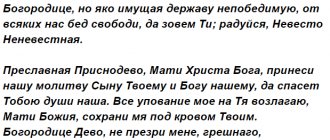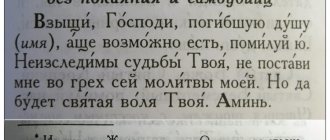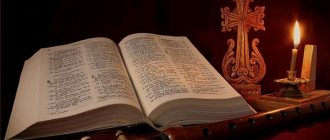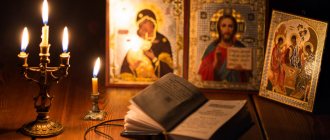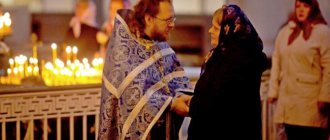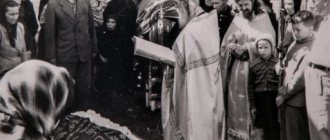When a person feels bad, nothing works out, his plans are not realized, and he wants to get outside help. And the best option in this case is a ritual of white magic , which is based on a correctly read prayer . But when trying to carry out such a ritual , a person is faced with some questions. One of them is whether the prayer spell can be read from the phone screen or the holy words must be learned by heart. And this is worth talking about in more detail.
MAGICAL HELP FOR FREE
DIVINATION, PREDICTION, CLAIRVOYANCE CONSULTATION, DIAGNOSTICS, TESTING
Write, call, ask questions. Ask about any problems. Consultations are conducted by trusted specialists. Contact us any time.
Features of prayer
A correctly read prayer can help resolve even the most difficult situation and cope with an intractable problem. This magical light ritual is allowed to be performed at home. But in order for the recited spell to help in a difficult moment or to achieve what you want, it must be voiced with unshakable faith.
It is not necessary to perform the ritual within the walls of the temple. A person can use a prayer book at home and independently perform the necessary light ritual. You can stand in front of the lit church candles or sit at the table on which the icon stands. Other features of prayer include:
- at the time of the ritual, you should avoid negative thoughts;
- You are allowed to seek help from both God and other holy saints;
- every word of prayer is filled with its own internal energy;
- there should be no malice at the moment of the ritual;
- the holy spell should be read as many times as stated in the ritual itself.
At the moment of reading the holy spell, a powerful energy force will be launched. Thanks to this influence, the impossible happens. But if the ritual is carried out with violations and without real faith, the ritual can be dangerous. It can cause unpleasant consequences in the future. Therefore, this type of witchcraft should be taken seriously.
Examples from history
If we remember the holy elders, Sergius of Radonezh prayed in the forest, sitting on a stump. Animals passed by him and did not touch him - so strong was the protection of higher powers through his prayer.
And all because he prayed not for himself, but for the entire people and for all of Rus', which at that time was groaning from the Tatar-Mongol yoke. It was to Father Sergius that Dmitry Donskoy came to ask for a blessing before the great Battle of Kulikovo, and the elder blessed him and prayed for victory day and night.
And when Dmitry won, Sergius felt it two days before the messenger arrived with the good news. Because “prayed” people have straight-knowledge, or foresight - they know how to foresee events.
Therefore, when making your requests, do not forget to pray for your country, for your city or village, and then for your family and for yourself.
Question for the priest. Prayer Rule
The rector of the Holy Trinity Cathedral in Saratov, Hegumen Pachomius (Bruskov), answers questions about the personal prayer rule of a Christian. Prayer is the free appeal of a person’s soul to God. How to correlate this freedom with the obligation to read the rule even when you clearly don’t want to do it? Freedom is not permissiveness. A person is designed in such a way that if he allows himself to relax, it can be very difficult to return to his previous state. In hagiographic literature there are many examples of ascetics abandoning their prayer rule for the sake of showing love to visiting brothers. Thus, they placed the commandment of love above their prayer rule. But it should be remembered that these people reached extraordinary heights of spiritual life and were constantly in prayer. When we feel that we do not want to pray, this is a banal temptation, and not a manifestation of freedom. The rule supports a person in a spiritually developed state; it should not depend on the momentary mood. If a person abandons the prayer rule, he very quickly becomes relaxed. In addition, it should be remembered that when a person communicates with God, the enemy of our salvation always strives to come between them. And not allowing him to do this is not a restriction of personal freedom. At what point in time should you read the morning and evening rules? This is clearly and clearly written in any Orthodox prayer book: “Rising from sleep, before doing any other thing, stand reverently before the All-Seeing God and, making the sign of the cross, say...”. In addition, the very meaning of the prayers tells us that morning prayers are read at the very beginning of the day, when a person’s mind is not yet occupied with any thoughts. And evening prayers should be read before bedtime, after any business. In these prayers, sleep is compared with death, bed with a deathbed. And it’s strange, after talking about death, to go watch TV or communicate with relatives. Any prayer rule is based on the experience of the Church, to which we must listen. These rules do not violate human freedom, but help to obtain maximum spiritual benefit. Of course, there may be exceptions to any rule based on some unforeseen circumstances. What else, besides morning and evening prayers, can be included in a layman’s prayer rule? A layman’s rule can include quite a variety of prayers and rites. This could be various canons, akathists, reading the Holy Scriptures or Psalms, bows, the Jesus Prayer. In addition, the rule should include a brief or more detailed commemoration of the health and repose of loved ones. In monastic practice, there is a custom to include the reading of patristic literature in the rule. But before you add anything to your prayer rule, you need to think carefully, consult with a priest, and evaluate your strengths. After all, the rule can be read regardless of mood, fatigue, or other cardiac movements. And if a person promised something to God, it must be fulfilled. The Holy Fathers say: let the rule be small, but constant. At the same time, you need to pray with all your heart. Can a person himself, without a blessing, begin to read canons and akathists in addition to the prayer rule? Of course it can. But if he not only read the prayer according to the desire of his heart, but thereby increases his constant prayer rule, it is better to ask the confessor for a blessing. The priest, looking from the outside, will assess his condition correctly: whether such an increase will benefit him. If a Christian regularly confesses and monitors his inner life, such a change in his rule will, one way or another, affect his spiritual life. But this is possible when a person has a confessor. If there is no confessor, and he himself decided to add something to his rule, it is still better to consult at the next confession. On days when the service lasts all night and Christians do not sleep, is it necessary to read evening and morning prayers? — We do not tie the morning and evening rule to a specific time. However, it would be wrong to read evening prayers in the morning and morning prayers in the evening. We should not have a pharisaical attitude towards the rule and read it at all costs, ignoring the meaning of the prayers. If you are not going to sleep, why ask for God's blessing to sleep? You can replace the morning or evening rule with other prayers or reading the Gospel. Is it possible for a woman to read the prayer rule at home with her head uncovered? “I think it is better for a woman to perform her prayer rule in a headscarf.” This cultivates humility in her and shows her obedience to the Church. After all, from the Holy Scriptures we learn that a woman covers her head not for those around her, but for the Angels (1 Cor. 11:10). This is a matter of personal piety. Of course, God doesn’t care whether you stand up for prayer with or without a scarf, but it is important for you. How are the canons and the procedure for Holy Communion read: on one day the day before, or can their reading be divided over several days? — You cannot approach the fulfillment of the prayer rule formally. A person must build his relationship with God himself, based on prayer preparation, health, free time, and practice of communication with his confessor. Today, in preparation for Communion, a tradition has developed to read three canons: to the Lord, the Mother of God and the Guardian Angel, an akathist to the Savior or the Mother of God, and the following to Holy Communion. I think it is better to read the entire rule on one day before Communion. But if it’s hard, you can spread it over three days. Often friends and acquaintances ask how to prepare for Communion, how to read the Psalter? What should they answer to us, the laity? - You need to answer what you know for sure. You can’t take responsibility for something, strictly prescribe something to someone else, or say something you’re not sure about. When answering, one must be guided by the widespread tradition of church life today. If there is no personal experience, you need to resort to the experience of the Church and the Holy Fathers. And if you are asked a question the answer to which you do not know, you should be advised to contact a priest or patristic works. I read the translation of some prayers into Russian. It turns out that before I put a completely different meaning into them. Should we strive for a common understanding, read translations, or can we understand prayers as our heart tells us? Prayers should be understood as they are written. An analogy can be drawn with ordinary literature. We read the work and understand it in our own way. But it is always interesting to find out what meaning the author himself put into this work. Also the text of the prayer. The author has invested a special meaning in each of them. After all, we are not reading a conspiracy, but turning to God with a specific request or praise. You can recall the words of the Apostle Paul that it is better to say five words in an understandable language than a thousand in an incomprehensible one (1 Cor. 14:19). In addition, the authors of most Orthodox prayers are holy ascetics glorified by the Church. How to relate to modern prayers? Is it possible to read everything that is written in prayer books, or prefer the more ancient ones? — Personally, I am more moved by the words of the more ancient canons, the stichera. They seem deeper and more insightful to me. But many people also like modern akathists for their simplicity. If the Church has accepted prayers, you need to treat them with reverence, respect and try to find benefit for yourself. But understand that some modern prayers are not as high quality in content as the prayers compiled by ancient ascetics. When a person writes a prayer for public use, he must understand what responsibility he takes on. He must have experience in prayer, but at the same time be well educated. All texts offered by modern prayer creators must be edited and undergo strict selection. What is more important: finishing the rules at home or being on time for work? - Go to work. If a person is going to church, then public prayer should come first. Although the fathers compared public and home prayer to the two wings of a bird. Just as a bird cannot fly with one wing, neither can a person. If he does not pray at home, but only goes to church, then, most likely, prayer will not work for him in church either. After all, he has no experience of personal communication with God. If a person only prays at home, but does not go to church, it means that he has no understanding of what the Church is. And without the Church there is no salvation. How can a layman, if necessary, replace the service at home? Today, a large amount of liturgical literature and various prayer books are published. If a layman cannot attend the service, he can read the morning and evening services and mass according to the canon. Is it possible to read the rule while sitting? The Apostle Paul writes: “Everything is permissible for me, but not everything is profitable” (1 Cor. 6:12). If you are tired or sick, you can sit in Church while reading the house rules. But you should understand what you are guided by: pain, which prevents you from praying, or laziness. If the alternative to reading prayer while sitting is not doing it at all, it is, of course, better to read while sitting. If a person is seriously ill, you can even lie down. But if he is just tired or is overcome by laziness, he needs to overcome himself and get up. During services, the Charter regulates when you can stand or sit. For example, we listen to the reading of the Gospel and akathists while standing, but while reading kathismas, sedals, and teachings we sit down.
Website of the Holy Trinity Cathedral in Saratov
https://www.eparhia-saratov.ru/index.php?option=com_content&task=view&id=4956&Itemid=5
Answer from an Orthodox priest
Photo: Flickr.com
Orthodox Christians can ask questions to priests online, which is very convenient. Taking advantage of this opportunity, one Christian woman asked the priest a question regarding the possibility of reading prayers from a smartphone, to which she received the following answer:
- sin is a violation of the Commandments of the Lord, and not the use of modern technologies to study His word;
- Orthodox prayer books and the Bible can be safely downloaded to your smartphone;
- Using modern technology to study the Lord's Word is not sinful.
Indeed, it does not matter whether a person uses an electronic book or a paper one, if he is committed to sincere prayer, unity with God and the fulfillment of His Will, then he can read prayers from a smartphone.
Reading prayers from a phone is allowed and is not a sin, but still, it is not recommended to use mobile gadgets within the walls of a church, since using a phone during the liturgy is not entirely appropriate.

